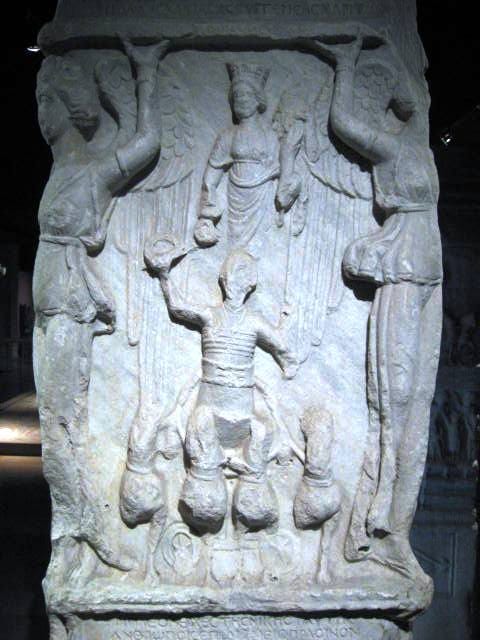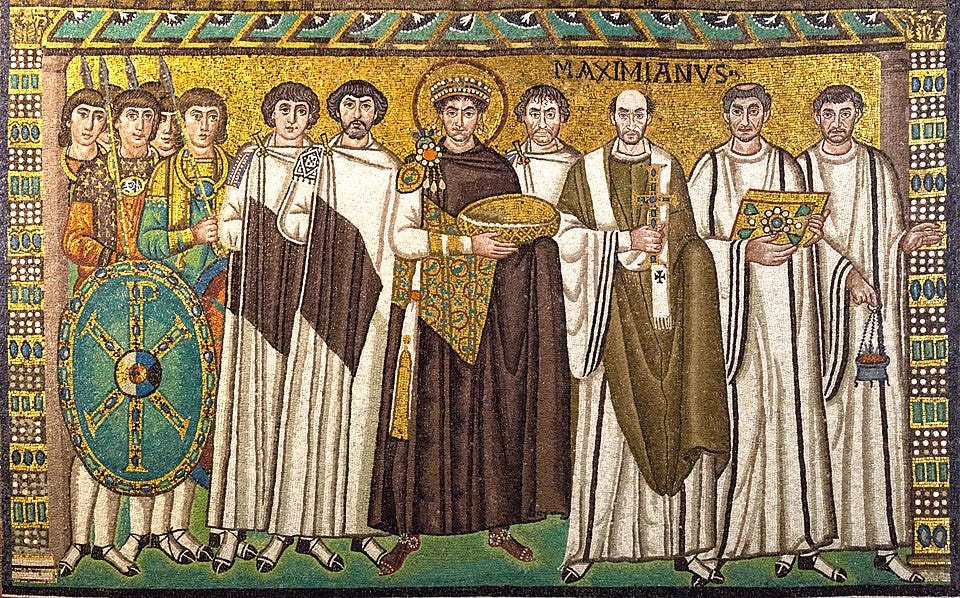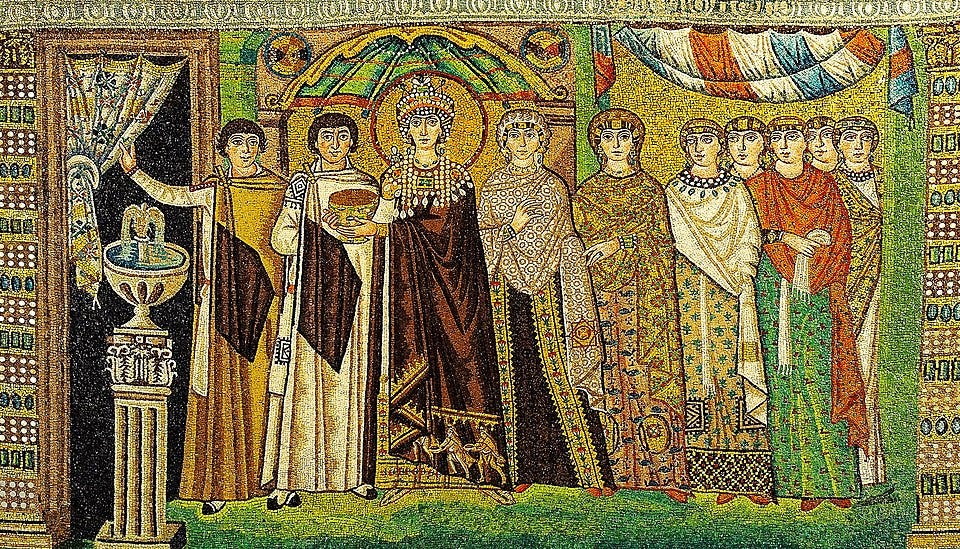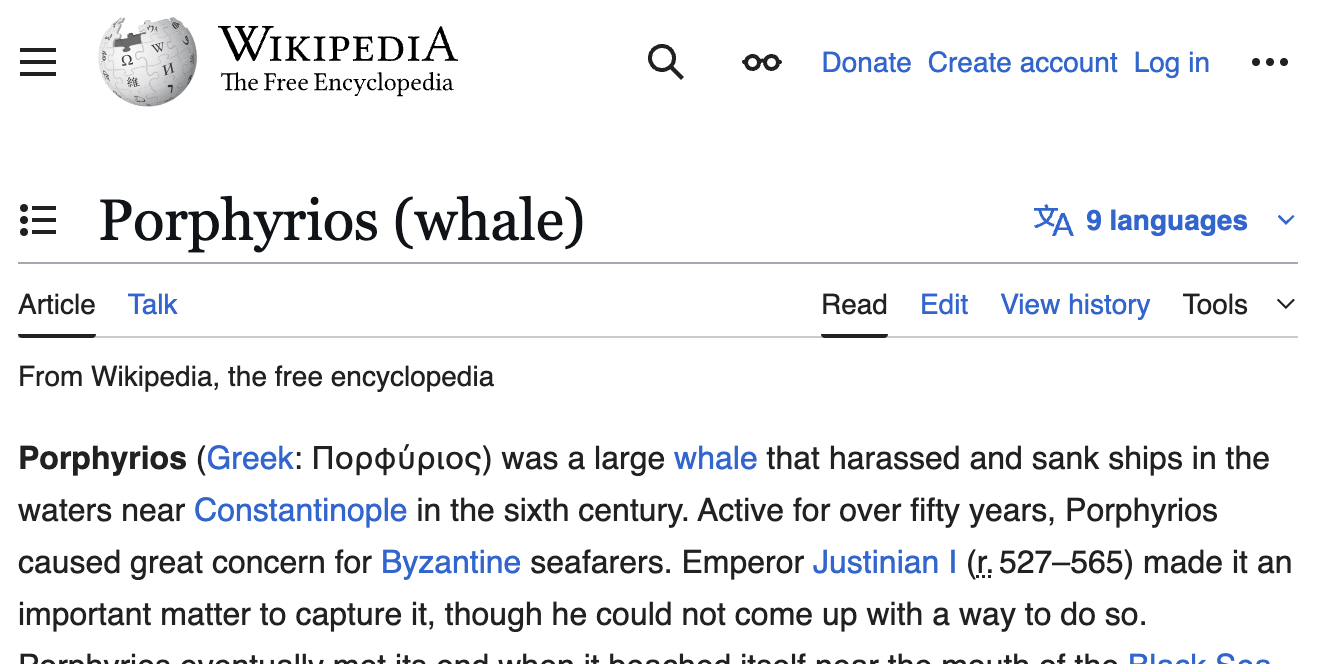Numlock Sunday: Christine Laskowski on T&J: A Roman Empire Love Story
By Walt Hickey
Welcome to the Numlock Sunday edition.
This week, I spoke to my friend and former FiveThirtyEight colleague Christine Laskowski, who produced an enormously delightful and fascinating history podcast diving deep into the era of Emperor Justinian and Empress Theodora called T and J: A Roman Era Love Story.
I have been a big fan of the show, which is about an under-explored but enormously consequential era of history and is centered upon a fascinating marriage at the center of it. The series just wrapped up, and I wanted to have Christine on to talk about the show and the process of making it.
We spoke about what makes this phase of the Roman Empire so unique, how Theodora was able to achieve an unprecedented level of power for a woman, history is ultimately written by the haters.
You should check the show out, it’s a great binge-listen in my experience, it’s available on Apple Podcasts, Spotify, and wherever you get your podcasts.
This interview has been condensed and edited.
Christine, it is so good to talk to you again. How are you?
I’m doing all right. It is rainy and cold in Berlin, but otherwise I’m getting along.
We are talking now because you have come to the conclusion of a really, really fun project about these two exciting historical figures that I think people might not be super familiar with. But if they happen to live in Western society, they are absolutely living in the reverberations thereof. Do you want to talk a little bit about T&J and what got you into them in the first place?
Yeah, sure. Are you also going to tell people that we used to work together at FiveThirtyEight?
Yes, we used to work together at FiveThirtyEight!
You should share links to our Margarita Cluster algorithm.
The clustering algorithm! We got drunk at work. It was great.
The Oscar one.
I look great in that!
Oscar one is so good. Oh my God.
We had budget for a tux rental. I mean, those are the days. RIP online media and their budget.
Okay, so T&J. The honest answer to that is: I feel like I am at my core a sucker for a love story. I love a good love story. I remember in high school, because I had the same teacher for honors world history and humanities, Ms. Sharon Proffert, may Allah shower his blessings upon her. I remember first learning about them in her class, and there was just something in my brain that was like, “Huh, like that seems unusual.” I think the only thing that we really learned about Byzantium when I was in high school was their story.
So basically, Justinian was this emperor during the 500s or the sixth century and was responsible for essentially what we call the Justinianic code, or codifying and organizing Roman law that created the foundation for European law today. That was a big deal. But then also he had this wife, Theodora, who was a former sex worker. He also introduced through her and credited her with legislation that protected sex workers and instituted no-fault divorce for women, just some progressive things.
There’s maybe half a page about this in my textbook, but wow, in the sixth century, there was a man with a lot of political power who was not afraid to marry a woman who was a former sex worker. And I think that always stayed with me.
Part of it, too, was that the very first pandemic occurred during his reign.
When the pandemic hit, I’d recently moved to Berlin. I found myself in lockdown here in a new city in winter. I was just reminded, because of my nerd brain, that the very first pandemic happened at that time. I just thought I would order some books and read up on it. The more I read, the more these things kept popping out at me. It was like 538 days, or the time I worked at Vox Explained. It drew on this muscle that I had strengthened, cultivated, which is when there’s something that is supposed to be familiar, but isn’t.
Like circus factions, like what the fuck is a circus faction? And like eunuchs. Okay, I understand what they are medically, but what did that actually mean in society? I just kept building this pile of terms that seemed to mean something on the surface, but I knew deep down that I didn’t fully understand them. It just signaled to me like, “Wow, if I don’t get it, then maybe there’s something there.” And I can use this interest to get other people excited about it as well.
It was like a great chance to dive into an era that I think, to your point, is just not super adequately covered, but nevertheless has a lot of interesting stuff going on. In America, I think the eastern side of the Roman Empire doesn’t get as much coverage. I think that there’s this era of the Dark Ages that gets hand-waved at a lot. The way that eunuchs were just like a Game of Thrones thing. This era had so many of the foundations of a lot of geopolitics and society and things that are still very much going on today.
The one thing that really made the show particularly enjoyable is the fact that the key source for all of this material comes from a hater. The origin of the origin of Procopius’s coverage, I think, is just really fascinating.
Can you speak a little bit to how strange it is that we know all these things about these people?
Yes. There are a lot of things that are fascinating about Procopius, but I think what’s important to understand about him first is that Procopius of Caesarea (because he was from this port city called Caesarea in what is today Israel) grew up in a very educated, upper-class Roman family. He ended up getting a job, we believe probably right out of law school, to be the legal secretary for this new general — one of Justinian’s former palace guards that he appointed as the lead commander against Persia. And that’s a very, very big appointment, because Persia was the frenemy empire next door that Rome, at this stage, always had to keep an eye on.
I know there’s a lot of tension between Rome and the barbarians in Europe, but I think we often forget or neglect the fact that Persia was THE big deal. However, there was a lot of respect between the two. I’ll liken it to between the English and the French, right? Like the French were fancy and sexy and cool, like that was Persia. It’s where silk came from; they were cool.
Putting that into perspective, Procopius gets this job, presumably as a younger man, fresh out of law school from this upper-class family in Caesarea to be this legal secretary to this new general Belisarius, who’s appointed by Justinian. What’s important to understand is that Procopius was around for a lot of the things that he talks about. He was the historian of record, and he embodied this tradition of historical writing that draws on Herodotus and Thucydides. He’s drawing on this very respected, well-cultivated, harnessed tradition of how histories are written. He publishes, I believe, a seven-volume work titled Wars, where he documents the wars that were fought during Justinian’s reign. A lot of them he was present for because he was the legal secretary of this general. Over time, his experiences and his opinions of Belisarius, this general, and Justinian really sour.
So he writes Wars. He also writes this other work called Buildings, which I also find incredibly fascinating because he’s tasked by Justinian, the emperor, with writing them. In those days, you had to have a very powerful, wealthy person commission these works for them to get done and for them to be printed.
So Justinian commissions Procopius to write Wars, like, “Hey man, chronicle all my wars.”
Procopius is like, “Great, I’ve been there for a lot of them, got it.”
Justinian goes to him, “Hey, can you write about all of my buildings and infrastructure projects, including the Hagia Sophia?”
Procopius is like, “Great, got it.”
Buildings is really fascinating because I think it’s easy to not appreciate how much infrastructure was involved at this time. I mean, we’re talking about re-channeling how rivers flowed in order to bring potable water to cities in central Turkey, stuff like that. Boring, but also eye-opening in terms of the scale and the scope of what an emperor’s day-to-day consisted of. And Justinian was very much like your modern-day megalomaniac — loved to build and rename things after himself.
But The Secret History is probably what you want me to discuss. And this is the ages for the podcast, basically. Procopius, the historian of record. Wars and Buildings are commissioned and published, and basically set him up, as I said earlier, as the historian of record of the sixth century. So that cements his reputation there.
Now, what he does is his off time, he writes this total teardown of Justinian, his wife Theodora, Belisarius (his former boss) and Belisarius’ wife Antonina. The formal term for it is a palinode, which is like a gossipy screed. He just decimates all their reputations.
What I found most interesting about that falls into two buckets. The first is that this is believed to have been written in 550 AD, and there were some sources that alluded to it, but the text itself had been lost for a very, very long time. It was rediscovered in the Vatican Library in the early 1600s by a guy named Niccolò Alemanni, and it was published in 1623. And this was so shocking because Procopius, for so long, had this reputation of just being the nice history guy recording all the good stuff that Justinian and Theodora had done, and Belisarius as well. For a long time, there was some debate as to whether or not it was the same Procopius.
In fact, it’s only recently, the last few decades, that a scholar named Dame Averil Cameron, who’s like a Procopius expert, basically made the case that it was the same person. And people and historians have largely accepted this. So that’s the first bucket, why he’s fascinating.
I just wanted to chime in here, it’s like if Robert Caro had a blog shitting on Lyndon Johnson that we just found years later.
Oh, yeah. Oh, yeah. Oh, totally. It’s exactly like that. You saw this one thing, and that was the record. That’s what everybody thought and understood about these people.
And then this sheds a whole new light on it. It takes it away from “Oh, this was just like a beautiful restoration period.” It causes you to reflect on the fact that it was radical in a lot of ways, especially for the old guard, patrician Roman elite, which I think is really interesting, right? Because Procopius is very much a conservative and a moral panicker. That comes out in some really funny ways, definitely misogynist. But in that way, it sheds a lot of light on these people. While you can take a lot of what he says with a grain of salt, it makes them more dynamic and actually more relatable. He’s someone that I’m like, “Oh, yeah, dude, that’s my Uncle Bill or whatever.”
Before I ever read, before I ever got The Secret History (and again, I didn’t learn ancient Greek, so this is all via translation), but when I finally got the primary text itself, I’d read quite a few works from contemporary historians about the period and about Procopius. And it’s really funny to see the sieve that historians would have to put his words through to make them more academic or more palatable. It was really funny to read it.
I think that a priority of mine for the podcast was to have Procopius speak more and to not try and interpret him, but just be like “This is what this guy says, how awesome.” He’s talking about quickies in closets, and gangbangs and all kinds of stuff.
It’s a level of candor that you just don’t expect. And I think that that is one reason that this felt so lived in. Stodgy is like a word that gets thrown a lot about historical podcasts. And this is not that, because you have a what has been the historical canon in no small part because of Procopius for millennia. And then you have the scuttlebutt, which is also because of Procopius for the past couple of hundred years. It’s very fun.
I want to talk a little bit about the Empress before we wrap up, because she is a very unique historical figure within her time.
And within our time, I would argue
Yeah. How did she wield political power in a way that was unique or even still fascinating?
I think the way she did it was by being really charming. It’s hard to find a contemporary analogy, but I do find that to be helpful. She was an incredibly talented performer and comedian, and as a sex worker was someone who would have been very familiar with this Roman elite, this male Roman elite and their ways and their secrets, right? Their sexual mores. I think a lot of her power came from knowing how to navigate these men and using comedy in a revolutionary way. I think you can see that.
I use this great Amy Poehler anecdote in it to try and help people understand the way in which she could be both scary as fuck and also incredibly disarmingly funny. And she use improv and comedy and her wit in order to get what she wanted out of these powerful men, even though she came from this disreputable background. She never let anyone see her be weak, maybe perhaps with the exception of Justinian. Who knows what went on there. She did a lot to advocate for the rights of women, as I mentioned earlier.
But I think also her power, too, came from the fact that she inspired Justinian as well. And he was more than happy to credit her. And that was also quite new and revolutionary. That’s not something that emperors typically did. Nor was it something that he would have felt any pressure or precedent to do. She was credited on lots of his construction works and buildings. He credited her with help on the Hagia Sophia, as well.
When it came to the rights of sex workers and the rights of women, it seems pretty clear that that stemmed from her own experiences as a sex worker, in Constantinople from an early age. In those days, you were born into a class, and that set you up for life. Not only was it radical in that time, I still feel like it is radical.
In those days, you were born into a class, and there was this interesting ranking at the time. I’ll just take you through it really fast. So in those days at the top, (outside of the emperor) there’s the clergy, and then there’s the administration, judiciary, people concerned with finance, academics and professional people, you have artisans, then you have the useless — who are the old, young and infirm. Then below that, you have theatrical people — the charioteers, musicians, actors, and so forth. Of course, those who are not even considered in this list are enslaved people, which I dedicate a whole episode.
But just to give you a sense, she was born into the lowest of the low. And there were actually laws in place that prevented people of senatorial rank from marrying outside of their class. Justinian had to get his uncle, who was the emperor to change the law in order for him to marry her. For someone like Procopius, this is world ending. And he even says it is such like, something that had never happened before during the time of the Romans. This epochal people that have been around for centuries and this dude changes this law, so that there’s all of this intermarriage. That’s also a reflection of power that she’d later wield, but it never strikes me that she’s manipulating Justinian in any way, like a puppet. They’re just deeply, deeply allied in ways that I try to parse, but I don’t think even I could ever fully comprehend.
Yeah, I really like this show in no small part because I think that it’s a lot of different stories going on at once. It is a started from the bottom, now we’re here story. It is the story of Procopius, a story of dynamic societal change. Justinian is wife guy makes good. There’s a lot of really fascinating things going on in it.
I don’t also want to make it sound like it’s too historical plot driven, because you do spend a lot of time in the world, in a way that I really, really, really enjoyed. There’s a whole episode on eunuchs, which has an amazing voice actor in it. Even just your stories about what building was like at the time, the religious fights at the time such as Chalcedonians (which apparently I grew up as, and I didn’t even know that was a word).
But either way, it’s super immersive. It’s super fun. It’s super mind expanding in a way that a lot of shows are not. For this last question, what’s the thing that you learned in the course of telling this story? Something that is just fun and interesting and cool that made you learn a new thing about the sixth century?
Oh my God. All my answers have been long, so I guess they’re used to it by now. It’s hard to even narrow them down. I’ll narrow it down to three things and they’re related.

The first thing is that during the early sixth century, there was a LeBron James of chariot racing and his name was Porphyrius Calliopas. I love this note because I feel like a lot of our understanding about the Roman Empire and anything related to sports has to do with gladiatorial games, and that is all well and good. They existed, they were fun. But for a large chunk of the Roman empire, (I think starting in the 300s, so around what you could consider the beginning of the Byzantine period) it was really chariot racing.
It’s really hard to explain why, other than “tastes change.” But I think a good argument for it is something that remains today: gladiatorial games were basically enslaved people dropped into a stadium arena to fight each other and wild animals to the death. That’s entertaining, but what chariot racing offered was essentially the possibility of a sports fandom, like a team fandom oriented around superstars, which is a harder thing to get when you have a bunch of enslaved people trying to fight for their lives and probably not winning all that long. They were still fighting on behalf of factions, but what chariot racing did was offer the existence of stars such as Porphyrius Calliopas.
I like to liken him to the LeBron James of the chariot racing world because he kept switching factions much to their consternation. So, you have this really nice example of these proto pro-sports teams, right? Where he’s like, “Okay, I’m going to fight, I’m going to ride for the Greens, and now I’m switching to the Blues and then back and forth,” which I just think is fucking hilarious. What’s also interesting about Porphyrius is that we don’t know if he’s the reason, if he is the namesake of the very first OG sea monster.
Thank Christ you brought up the whale. Oh my God. I was kicking myself for not doing it. Go on.
Yeah, dude.
Procopius has this like incredible anecdote about this whale that terrorized the seas and harbors and ferries around Constantinople for what he says is about 50 years. This whale, this OG sea monster was named Porphyrios.
Whether it was after Porphyrios Calliopis, cause he was such a bad-ass charioteer, or if it had to do with Porphyria — the name of purple at the time in ancient Greek. There could be other reasons for it, but I just wanted to bring up the sea monster because it would just fuck with people. And it’s unclear if it was a sperm whale or a killer whale, there are arguments for both. I don’t want to give it away, but this sea monster meets an unhappy end. The reason I want to bring that up is because there’s so many antecedents. I don’t know if you remember all of the Orcas learning how to take off the rudders of sailboats in the Strait of Gibraltar during lockdown
.I definitely had a Google alert for that exact situation. Go on.
So I’m just like, “Oh my God, like they have a pandemic, we have a pandemic. They had a major climate event, we’re experiencing a major climate event. They had a sea monster, we’ve experienced sea monsters.” Again, I don’t want to scare anyone, but they went off into the Middle Ages. I’ve been thinking a lot about neo-feudalism. Here we are. There’s a lot to learn.
Again, it’s a really fun show. I highly recommend that people check out T&J, A Roman Empire Love Story. Where could folks find it? I’m talking to you just as you have concluded it. I listened to the bulk of it on a road trip, and I had a really good time doing it. I think that’s one reason that I want to have you on. If folks are looking for something to listen to over the course of the next few weeks, over the course of the holidays, it’s a super well-produced. Where can folks find it, and where can folks then find you?
Oh yeah, so the podcast itself is available on Apple Podcasts and Spotify and, I mean, basically wherever you get your podcasts. I highly recommend people listen to the variant past the credits because there are original songs that I have written and performed that tie to the episode’s theme. They are all now available, since the show has ended, in a podcast soundtrack album, which is also available wherever you listen to music — Apple Music, iTunes, Spotify, Tidal, YouTube Music, Amazon Music, etc.
And yeah, the other thing I just want to say is that I think sometimes folks can feel like, “Oh, there’s like some test I’m not remembering everything.” The whole point is just to let it wash over you. You can listen to them multiple times. Listen to the song. It’ll help you remember some of the things. Just let it wash, like the waves of the Mediterranean Sea. It’s all good.
It was great. It’s the fuzzy history stuff where people sometimes enter stories and leave them for no reason, and that’s just a thing that you get to deal with. You should be so proud of it, Christine. It’s a really, really good show. I really enjoyed it.
Thank you, Walt. Aw, having you as a fan is everything.
Thanks for coming on!
Edited by Crystal Wang
If you have anything you’d like to see in this Sunday special, shoot me an email. Comment below! Thanks for reading, and thanks so much for supporting Numlock.
Keep reading with a 7-day free trial
Subscribe to Numlock News to keep reading this post and get 7 days of free access to the full post archives.




